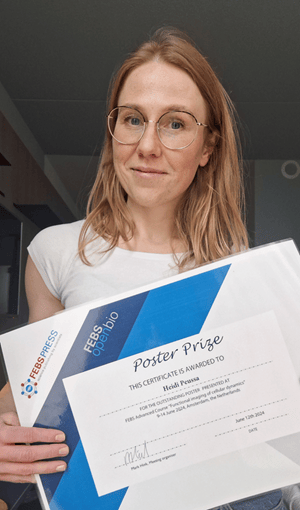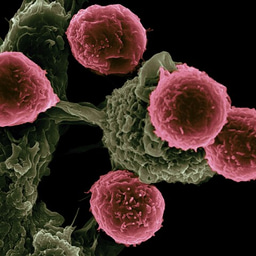Meet Heidi Peussa: FEBS Advanced Courses 60th Anniversary Awardee

Our interviewee is Heidi Peussa, a PhD student from Tampere University, Finland and a member of the Biobio Society. Heidi received a FEBS 60th Anniversary Award and the Outstanding Poster Prize from the FEBS Open Bio at the FEBS Practical Course 'Functional imaging of cellular dynamics' (9–15 June 2024) in Amsterdam, the Netherlands.
Tell us about your research topic/work. What project(s) are you working on? What is the aim of your study?
My research focuses on the mechanical signaling and calcium dynamics in epithelial cells. Currently, I am studying how the viscoelastic properties of the substrate affect force transduction at the interface between the cell and the basal extracellular matrix (ECM). To do this, we have established a new setup that combines a light controllable coating and a thin polyacrylamide (PAA) gel that cells can be cultured on. The light-controllable Disperse Red1-based coating enables generating spatiotemporally precise mechanical deformation beneath the cells and the PAA gels can be used to modify the mechanical properties of the substrate on which cells grow. The aim of our study is to understand how cells perceive similar deformations depending on the stiffness and viscosity of their substrate. As an output of mechanical signalling we are using calcium dynamics.

Heidi Peussa with the FEBS Open Bio Outstanding Poster Prize.
Photo credits: personal archive.
Who or what inspired you to choose a career in science?
I have always been interested in biology and wanted to understand how things work on a detailed level. This curiosity has guided me to the field of cell biology. I realized I like research during my master's thesis project. I also became acquainted with my current PI, Teemu Ihalainen, during that project and was fascinated by cellular biophysics, the topic of his research group.
How did you learn about the FEBS Advanced Course? Why did you choose this course to attend?
I heard about the FEBS Advanced Courses from my PI, who strongly recommended them. I chose this course because my work revolves heavily around live cell imaging and I was therefore interested in learning new techniques.
How does attending this course influence your present and future plans? What are the benefits of attending the FEBS Advanced Course?
I got plenty of new ideas for my research from this course. During the week I learned a lot of theory and we also got to do a lot of practical training with some very cool microscopes! Additionally, I got to know many amazing people who share an interest in science and imaging. The course increased my expertise and gave me new connections.
What work were you presenting at the FEBS Advanced Course?
In my poster, I presented an overview of my past and current projects that revolve around cell-ECM mechanotransduction. We have been interested in how cell-ECM interaction affects intracellular calcium dynamics with a special focus on the mechanosensitive ion channel PIEZO1. I have utilized the light-controllable properties of an azobenzene-based material Disperse Red1 for the mechanical modification of the substrate on which cells grow, and a genetically encoded calcium indicator to detect the mechanically induced cell responses. My work relies heavily on confocal microscopy – calcium dynamics and PIEZO1 localization are detected by various imaging techniques, and also the Disperse Red1 substrate deformation is controlled with the lasers of the microscope.
How does it feel to receive a FEBS 60th Anniversary Award at a FEBS Advanced course as recognition for your work? How do you see this Award influencing your career and future?
I was very grateful and honored to receive this award. It is an impressive addition to my CV!
What is your advice to aspiring students/scientists?
Focus on what you find interesting!
Where do you envision the future of your career?
After my PhD, I would like to live abroad for a while. Otherwise, I have no idea yet!

For more information about the FEBS Advanced Courses programme visit the FEBS website.
Photo by Pawel Czerwinski on Unsplash.





Join the FEBS Network today
Joining the FEBS Network’s molecular life sciences community enables you to access special content on the site, present your profile, 'follow' contributors, 'comment' on and 'like' content, post your own content, and set up a tailored email digest for updates.